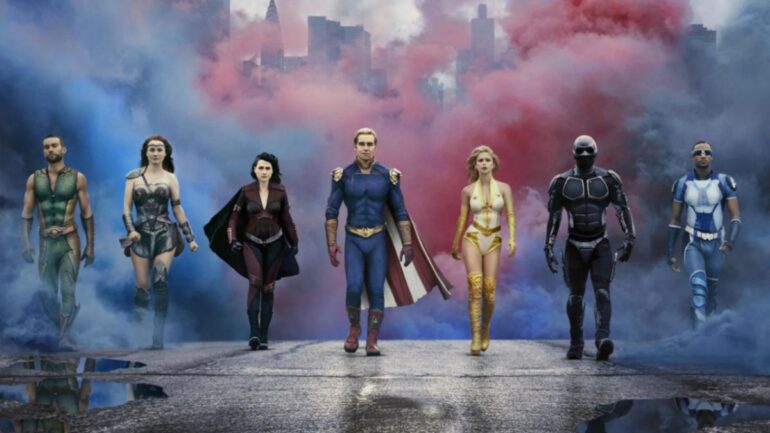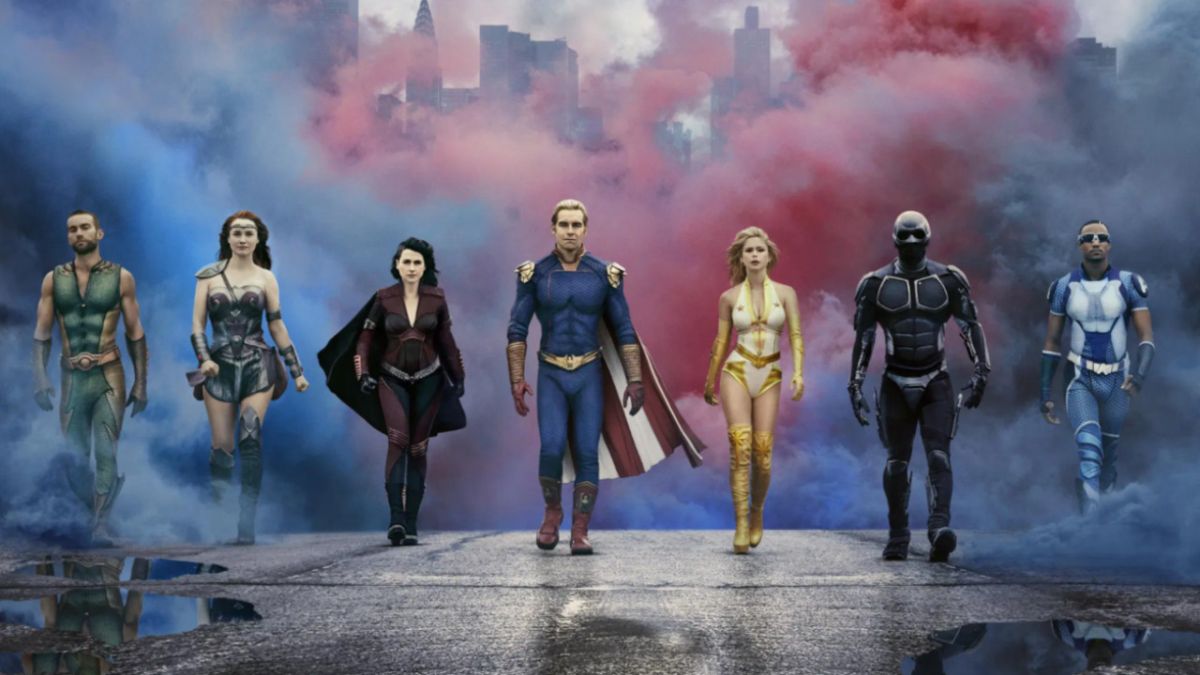The Boys – no longer remotely all-male, incidentally – are back in town, ho ho. And the advent of a second season has honed off their obvious rough edges. Just as Tomer Kapon’s Frenchie has become distinctly more French, Karl Urban’s wonderfully profane Billy Butcher now sounds consistently British, without the rare-but-present slips into his native Kiwi. Of course, nobody much cares how convincing their accents are, so long as they’re slugging it out with people in rubber suits on a regular basis.
As deconstructive as it may get, The Boys is still a superhero show, so there’s plenty of slugfests to go around. But when there’s a moment of calm, to meditate on the kind of morally grey landscape the show’s set in, it can be surprisingly grim. There’s an obvious protagonist-antagonist divide, no question, but the actual moral difference between them is hazy to the point that even invoking the term ‘antihero’ seems too soft. This is the realm of realpolitik, and not so much of making hard decisions, but rather leaping into them headfirst without much thought, then scrambling to justify the awful consequences later.
However, I make that distinction for a reason. Lest the whole show seem like a bleak, Children Of Men kind of affair, whenever anyone’s actually doing these horrible things, it’s very often the height of the show’s black comedy. This isn’t simply a matter of tragedy plus time equaling comedy – this is taking comic-book-style absurdity and playing it out in live action. When some poor sucker gets their head exploded, it’s shocking, of course it is, and the most immediate response to that kind of shock can only be to laugh.
Despite a strong vein of incredibly gory slapstick, The Boys’ most pointed satire has always been directed towards the superhero genre itself – and in that way is like the snake finally eating its own tail. It depicts a world in which one simply cannot escape superhero media, that is to say, a lot like our own world and the MCU’s dominance at the box office (this year is the first since 2009 to see no new MCU releases, and a lot of people had to die for that to happen).
There’s always been a running tension within The Boys between the superheroes actually being superheroes, and being vacuous, self-important celebrities. This comes to a head when we see them filming their in-universe equivalent of The Avengers, and the supes are actually playing themselves. Bluntly, this doesn’t make a lot of sense if you think about it for five minutes – not least because we later see porno versions of The Seven where they’re more sensibly played by stand-ins. But you don’t really need to think about it, as it’s the straightforward comedy of deliberately bad acting rather than some key plot point. This is not a part of the show in desperate need of realism and verisimilitude.
This points towards the other tension at work within The Boys: the inevitably heightened reality of the superheroes, versus the grit-strewn world everyone else has to live in. Of course, there isn’t a hard and fast line between these realms, quite the opposite. The absolute funniest moments are when they cross the streams, when the superheroes have to choke down a bit of gritty reality, or otherwise, when some poor ordinary person has superpowers completely upend their life.
When these two strands are divided, however, The Boys begins to struggle. There’s a couple of occasions through the second season when our lovable normals have their backstories illustrated in fairly plodding fashion – plodding, not least, because it’s character stuff that was already implied if not stated outright. If they’re bouncing this off someone else (often – aha! – one of the supes) it can just about work, but when it’s one of them off on their own, dealing with a couple of cameo appearances we’ll never see again, then it adds nothing.
Thankfully, The Boys can move on from dead ends like this fairly quickly. Having to juggle an ever-expanding main cast works in that there’s always some thread to be followed – but it’s painfully noticeable when one of them’s going through a moment of Character Development and there’s a good half-dozen people out of focus in the background, waiting for something else to happen. The broader narrative split between the superheroes and the boys does a lot of work rescuing this, since if the show was having to wrangle both these groups in the same scenes it could well end up crumpling under its own weight.
As such, there’s not an awful lot of space left for new addition Stormfront. For those familiar with the darker recesses of the internet, the name may be familiar – and so when the other shoe of her backstory drops, it won’t be much of a surprise. But while Aya Cash gives a fine performance as a socially adept and eminently hateable manipulator, they never get any material quite like the grandiosity of Antony Starr’s bad Superman. Her introduction as social media-savvy #yasskween quickly gets replaced by rabble-rousing public appearances, in a way which, yes, may ring a few bells but does also feel somewhat disjointed.
Cash’s role is challenged, too, by Giancarlo Esposito’s evil CEO now making semi-regular appearances – it’s the same character Esposito’s been playing since Breaking Bad, the face of civilised, affable monstrosity. Even beyond the public appetite for more Gus Fring (there’s a reason Peter Gould shoehorned him back into Better Call Saul), this does fit the tone of The Boys. Most of the characters, and certainly the superheroes, are recognisable, serial-numbers-filed-off archetypes, and by now Esposito’s refined psycho is certainly that. One wonders if it’s simply the old paper bag test – something Stormfront could tell you all about – that keeps the industry from simply giving him his own show where he can be a Hannibalesque bastard for the ages.
Season two of The Boys ends – how to complete this sentence without spoiling anything? – on a more obviously final note than the first, whose conclusion had the feel of a mid-act break whereas this is, very definitely, the end of the movie. There’s at least one or two narrative avenues left open for a third season, which, despite the fans’ anger over this season’s idiosyncratic release schedule, now seems very likely. But there’s no obvious dangling thread leaving this season feeling somehow incomplete.
READ NEXT: 11 Best Horror TV Shows For Halloween
Some of the coverage you find on Cultured Vultures contains affiliate links, which provide us with small commissions based on purchases made from visiting our site. We cover gaming news, movie reviews, wrestling and much more.




